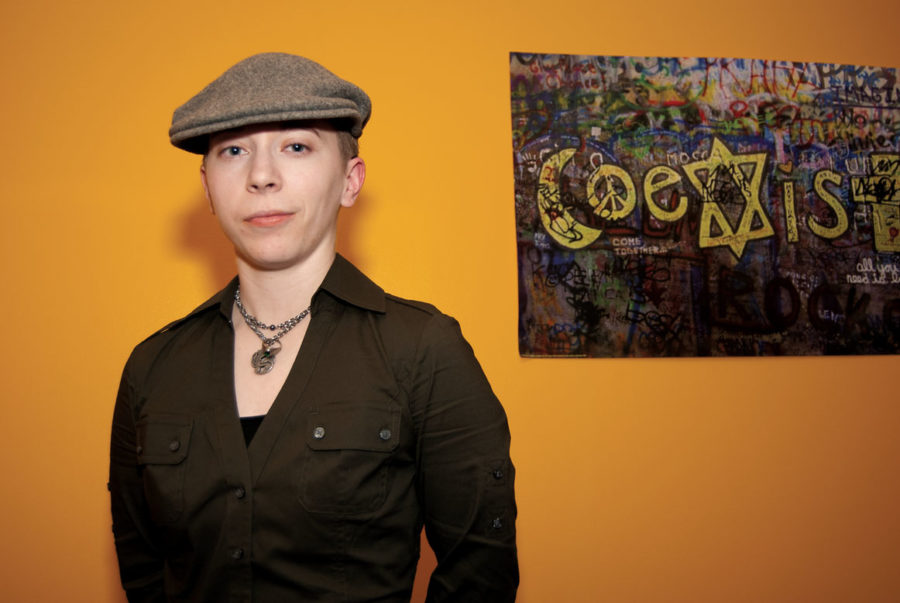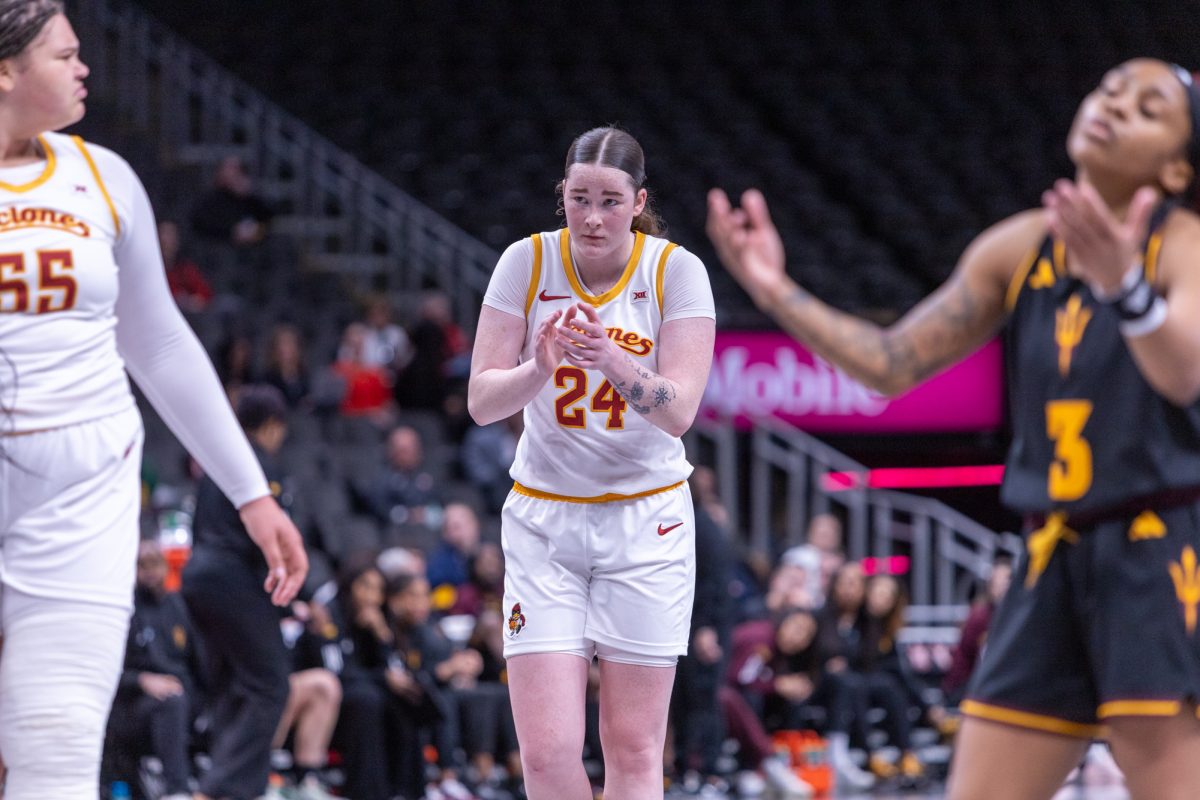A secret life: Lesbian student comes out due to DADT repeal
Photo: David Derong/Iowa State Daily
Veronica Olson, senior in philosophy, plans on joining the marines after she graduates from Iowa State next winter.
January 18, 2011
Veronica Olson is risking everything this morning.
With the repeal of the Don’t Ask, Don’t Tell policy Dec. 18, 2010, Olson, senior in philosophy, is finally able to come out as a lesbian without the fear of being refused entrance into the service after she graduates next semester — almost.
Although the policy has passed legislation, there is still a chance it will be reinstated, which means all of Olson’s hard work in the Naval Reserve Officers’ Training Corps (NROTC), her childhood dreams of being in the military and her future career are over.
Olson is petite and shy. She wears a deep-green, button-down shirt, accenting the barely-there green tips in her hair; her smile and laugh break up her guarded front once she begins to speak about her life and her lackluster running time during her ROTC days. That is, until she starts to talk about DADT.
“I’m scared a little bit,” Olson said. “There’s a chance the repeal will be taken back. That’s a concern with me talking and letting you use my name and picture. It’s a small chance, but the risk of losing the career I want because I speak out for something I’m passionate about … if I got to become an officer, and I didn’t do this, I’d be more ashamed. I don’t want to be that kind of officer.”
Olson aspires to become an officer in the Marines. When her elementary classmates wanted to be firemen and ballerinas, she wanted to be a U.S. Marine — a lifelong goal that controls every aspect of her life.
DADT was implemented when Olson was 4 years old.
Her sexual orientation wasn’t something she thought about back then, but it was something that Olson said phased in around first or second grade and continued on through her high school years.
When her sexuality started to develop, she knew that if she wanted to serve in the military she could not have romantic relationships.
She has only dated one woman briefly last year, and DADT was a large reason for the split.
“I didn’t want to date someone and try to have to hide it,” Olson said. “I couldn’t ask someone to be in the closet for me, especially if they were out in the first place.”
Perhaps the biggest strain from DADT was while Olson was in ROTC. She constantly received friendly questions about dating and weekend plans, which would be covered up or avoided for protection.
“Every week, every day, you have to try to avoid or decide between lying and not answering [the questions] or risk losing your career,” Olson said.
Having to hide who you are is incredibly stressful and has a negative impact on the individuals who must do it even if it doesn’t have any impact on their peers, Olson said.
Some who support DADT have been vocal about their concerns of not having “homo shoved in their faces,” Olson said.
Coming out
The end of 2010 was anything but ordinary for Olson.
She officially came out to her parents and younger sister at a restaurant in mid-October.
“I know that my family was accepting,” Olson said. “That’s who they are. I knew I was safe with them.”
As soon as she told her parents, they went back to asking her sister how her calculus class was going and left Olson with a racing heart, but all was well.
In November, Olson came out to the most important person in her extended family — her grandmother.
Olson’s eyes swelled with tears as she recalled the day she had to tell the woman she had always looked up to about the secret she had kept for so long.
“I’m going to try not to cry … she [her grandmother] just said, ‘I’ll love you no matter who you are. Love is love. I love you,'” Olson said.
Olson didn’t come out to anyone else in her family because DADT was still in place at the time.
The most important people in her life knew and she didn’t want her extended family, including a cousin in the military, to have to choose between reporting her to the military or keeping her secret.
The reality of DADT
All NATO members allow homosexuals to openly serve except for the United States and Turkey, according to the Christian Science Monitor.
More than 13,000 American military men and women have been discharged since the 1994 policy implementation, not counting those who left on free will.
The Williams Institute at UCLA School of Law reported that DADT has cost more than $1 billion.
Research studies performed at the Palm Center at the University of California, Santa Barbara, found that “allowing homosexuals to serve contributes to improving the command climate in foreign militaries, decreasing harassment, retaining critical personnel and enhancing respect for privacy.”
Brad Freihoefer, coordinator for Lesbian, Gay, Bisexual & Transgender Student Services, has worked with students who are struggling with the DADT policy and their dedication to not only their country but to themselves.
Honesty and integrity are fundamental parts for many in the armed forces, Freihoefer said, and having to go against them by hiding their sexuality and being in fear of being discharged are significant complications posed by the policy.
“The repeal is historic in nature,” Freihoefer said. “This will allow for family support and will actually strengthen our armed forces.”
Disagreement over the repeal and a sense of “don’t fix what’s not broken” by those in Washington and around the country has sparked discussion that DADT was beneficial in separating sexuality from the actual job of serving.
“How did they know it worked?” Freihoefer said. “No, in the middle of combat, no one is worrying about sexuality.”
Although sexuality doesn’t matter on the battlefield, Freihoefer feels it’s important for military persons to be able to live equitably, honestly and with integrity — something the military has taught those like Olson since their first days in ROTC training.
An honest life
“I just want to be a good leader, a good professional. It’s one of the reasons I’m doing this. I want to stand up and take care of my people … even if I don’t know them,” Olson said.
Although DADT’s repeal isn’t finalized, Olson is optimistic about her future.
She plans on dating more after she graduates, but isn’t worried about anything except the next step in living out her dream.
“As mentioned before, my run time is something I’m working with. Marines have very high physical standards. I could qualify, but I want to be better than what I am. I wouldn’t want to do anything else but that — lead by example, lead from the front.
“I still believe in, you know, the fact that they’re trying to do something good in the world, and that’s how I would like to put in my little bit of good in the world,” Olson said.







